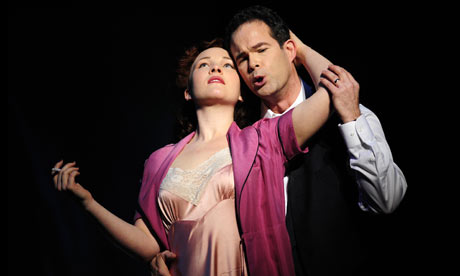
John Adams's Doctor Atomic, to a libretto by Peter Sellars about the first atomic bomb test, has already been seen in an original San Francisco version and at the New York Met, relayed to cinemas worldwide last year. This was its first UK staging, in Penny Woolcock's Met production, with Adams's meditative, richly faceted score incisively conducted by Lawrence Renes. Impressive though the screen relay was, nothing prepared you for the impact in the theatre. If a work forces you, simultaneously and uncomfortably, to clench your limbs and hold your breath, you have to take notice.
Peter Sellars's script, a quixotic collage of historical data and poetry, doesn't bother much about dramatic conventions. True, the opening blinds you with scientific terminology rather than emotion or chat. How often does the word "dodecahedron" appear in opera? (Answers on a postcard. I can think of one occasion.) That's the point. This is not a political work. It's about how the beauty of mathematics, when applied to life, becomes a moral dilemma of incalculable human proportions.
Gerald Finley plays the troubled J Robert Oppenheimer, whose "Batter My Heart" setting is surely the finest aria written since Puccini. Over a huge range, Finley's voice has no discernible gear-shifts or squeezed notes. His seriousness and sensitivity are affecting. Sasha Cooke, as his lonely wife Kitty, was radiant-toned and anguished. Thomas Glenn and Meredith Arwady stood out in a powerful cast, with excellent chorus work after a messy start.
The first-night stalls were full of usual arts-world stalwarts but upstairs was awash with young faces, securing last-minute tickets for £5. Adams, whose Nixon in China became a late 20th-century operatic icon, has produced another landmark work, less obvious, more faulty, but finally more terrifying and provocative. In the closing minutes electronic noise roars and thunders round the theatre. If the earth didn't move for you, it did for me.

